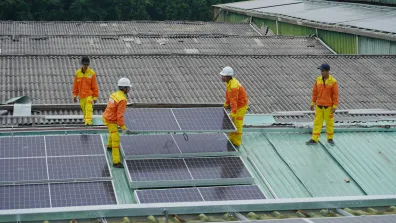The call for climate reparations

While wealthier nations carry on polluting and refuse to pay for the damage they have caused, the effects of climate breakdown are growing — as are the costs for adapting to a heated world. Communities across the Global South are calling for financing for loss and damage: compensation for what they have lost.
A heated world
This year has seen climate breakdown wreak havoc across the globe: from record heatwaves and fires spreading across Europe, to flooding displacing 33 million people and submerging a third of Pakistan, to the 55 million people pushed into poverty and climate-induced famine by droughts in the horn of Africa. The effects of the climate crisis are hitting us all, but it is those least responsible for the crisis who are paying the heaviest price. The need for climate action is ever more pressing.
Centuries of colonialism and exploitation have seen Global North countries and corporations become rich, by extracting massive amounts of wealth from countries in the Global South. It is this very same model of exploitation that has caused the climate crisis.
Rich, industrialised Global North countries have contributed an estimated 92% of excess historical carbon emissions, and 37% of current emissions – despite being home to just 15% of the global population.1 Poorer Global South countries have contributed very little to global carbon emissions yet bear the brunt of extreme climate breakdown — such as the devastating flooding in Pakistan.
Broken promises
In his opening speech at COP27, UK Prime Minister Rishi Sunak talked tough on the climate crisis. But for decades the UK government has been saying one thing and doing another. The UK was the President of the COP26 climate summit – yet has failed to do its fair share of action, instead expanding its fossil fuel use, refusing to meet its climate finance targets, and continuing to promote trade deals that lock in fossil fuels and other corporate interests.
And the UK government’s reliance on oil and gas is worsening climate breakdown while driving up energy bills at home – contributing to the cost-of-living scandal, with the poorest in the UK hit the hardest.
With the PM Rishi Sunak pledging UK support at COP27 for an initiative to save world forests – which absorb carbon and lock it up for centuries – before ruling out providing any funding to deliver it, the UK’s stance looks more and more like greenwashing.
Wealthy countries in the Global North such as the UK have long made big promises on tackling the climate crisis — but have so far failed to deliver the resources needed to honour them.
In 2010, wealthy countries agreed to provide $100 billion annually in climate finance by 2020. This goal has still not been met, despite numerous attempts to claim success by shifting the goalposts to include debt-creating loans and recycled aid commitments in the total figure. Once this creative accounting is removed, between 18-30% of the $100 billion-a-year goal has been realised.2
Climate debt
The UK’s climate debt is estimated to be in excess of £1 trillion3,4— calculated from the UK’s share of all-time carbon emissions; and quantifying both the benefit a country has reaped and the damage it has sown. This figure may seem enormous, yet net $2 trillion5 (£1.7 trillion) is extracted from the Global South to the Global North by corporations, banks and richer Global North governments every year.
Paying off climate debt means the UK prioritising doing its fair share of climate action — stopping further harm, funding repairs to reverse the harm already done and compensating for damage that cannot be repaired.
Repaying this debt is a matter of justice. The UK must take responsibility for its present and historical role in fuelling the climate crisis.
The call for climate reparations
It is time the UK and other rich industrialised Global North countries took responsibility for fuelling the climate crisis — having produced the majority of all-time global carbon emissions — by paying climate reparations to countries in the Global South.
The call for climate reparations is about making those who did the most to cause the climate crisis take responsibility for their impacts. Countries in the Global South have contributed the least to cause the climate crisis, yet are experiencing the worst impacts of climate breakdown, from economic damages to the loss of people’s lands and cultures.
By climate reparations, we mean that countries must:
- Stop doing harm, by rapidly cutting their carbon emissions,
- Repair harm, by providing technology and finance to support people around the world to adapt to the crisis,
- Compensate for harm that cannot be repaired, via payments to Global South countries for loss and damage.
The UN Environment Programme’s Adaptation Gap Report (2022) conservatively estimates that around $500 billion a year is needed for climate adaptation measures alone.6
Who should pay for climate reparations?
Those who have profited from and contributed the most to the climate crisis should finance climate reparations. It's time to make UK-based corporations, banks and fossil fuel companies pay up for the damage they’ve caused; and end the age of huge profits with little to no tax.
Globally, just 100 corporations are responsible for a massive 70% of all global emissions.7 UK-based fossil fuel giants such as Shell and BP rake in huge profits while extracting oil and gas from countries around the world – but pay little to nothing in tax. And as energy bills continue to rise, Shell and BP’s profits are at record levels. Shell has made over £26 billion so far this year — yet paid £0 in new windfall taxes.8
The UK government must hold the polluters to account. It must take responsibility for enabling fossil fuel companies to cement Britain’s role as a major contributor to the climate crisis. The UK government prefers to rely on oil and gas rather than transitioning the country to alternative clean energy sources, all while letting UK-based fossil fuel giants pay pennies in tax.
Paying climate reparations does not have to mean diverting money from UK public services to pay for it. We have a choice between soaring fossil fuel company profits or putting the needs of people and planet first.
Financing plans
Having blocked and frustrated any attempts to do so at previous climate summits, the US, EU and UK agreed to formally discuss ‘financial arrangements’ for loss and damage at COP27. However, they continue to insist that a loss and damage fund, or compensation as part of climate reparations, should come in the shape of loans or insurance schemes from private funds — ultimately making the rich richer and the poor poorer. In short, wealthy countries are suggesting business as usual.
Instead, we are calling for a loss and damage financing facility, funded with new money – not loans or debt cancellation – and with no strings attached for the countries on the receiving end. The fund must be paid into equitably by richer industrialised nations, based on historical responsibility and ability to pay, and it must be shaped and implemented with involvement from the Global South communities bearing the brunt of climate breakdown.
Cancel the debt
The UN Intergovernmental Panel on Climate Change (IPCC) now estimates that 3.6 billion people are vulnerable to the worst impacts of the climate crisis.9 This is the inevitable result of business as usual — a rigged global economy designed to maximise profit for the few at the expense of the lives and livelihoods of the majority of people across the world.
Unequal global tax and trade rules, and the unfettered power of corporations, leave Global South countries dependent on international loans and export-led trading models – based on the exploitation of cheap labour at home – to pay back unjust colonial debts. This system has left half the world locked into poverty — denied basic human rights such as access to energy, food, healthcare, and a living wage.
Many countries in the Global South remain locked into debt, servicing vast international loans, all while facing cost-of-living crises and the devastating effects of the Covid-19 pandemic and climate breakdown on lives and livelihoods.
That is why alongside climate reparations we support the call to cancel all illegitimate Global South debt – which since 1980 has resulted in close to $4.6 trillion in payments from the Global South to the Global North.10 Debt is unjust and debt cancellation should never be paid as a form of climate finance.
Debt cancellation would ensure Global South countries can use their resources to support their own citizens, by investing in public services such as healthcare. The debt crisis and wealth extraction from the Global South has led to 134 countries forced into austerity plans – that’s 6.7 billion people.11
Today, there are 64 countries in the world which spend more on debt repayments than on their healthcare systems11, let alone on adapting to the climate crisis. All while $2 trillion continues to flow from the Global South to banks and corporations in the Global North.
1. https://www.thelancet.com/journals/lanplh/article/PIIS2542-5196(20)3019…
2. https://www.nature.com/articles/d41586-021-02846-3
3. Climate debt of £1 trillion is the calculated fair share of the UK's responsibility for 1.5C global heating mitigation measures; this means it is at the lower end of estimates as it doesn’t include the UK's fair share of adaptation or loss and damage financing. Climate reparations are separate to the UK's historical reparations, which would be many more £ trillions. Britain extracted £45 trillion during its colonial rule of India alone.
4. https://calculator.climateequityreference.org/
5. https://www.tandfonline.com/doi/abs/10.1080/13563467.2021.1899153?journ…
6. https://www.unep.org/resources/adaptation-gap-report-2022
7. https://www.theguardian.com/sustainable-business/2017/jul/10/100-fossil…
8. https://www.theguardian.com/business/2022/oct/27/shell-doubles-its-prof…
9. https://www.ipcc.ch/report/ar6/wg2/
10. https://www.theguardian.com/global-development-professionals-network/20…
11. https://assets.nationbuilder.com/eurodad/pages/3039/attachments/origina…
12. https://debtjustice.org.uk/press-release/sixty-four-countries-spend-mor…


